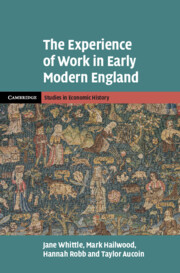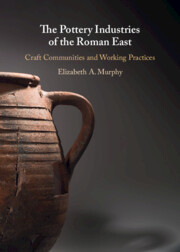Refine search
Actions for selected content:
202 results

Self-Made
- The Stories That Forged an American Myth
-
- Published online:
- 30 October 2025
- Print publication:
- 30 October 2025
Chapter 20 - Bloomsbury and the Meanings of Labor
- from Part IV - Public Bloomsbury
-
-
- Book:
- A History of the Bloomsbury Group
- Published online:
- 09 October 2025
- Print publication:
- 23 October 2025, pp 334-348
-
- Chapter
- Export citation
4 - Food as a Social Relation: Sabzi and the Question of Household Skilled Labor
-
- Book:
- Tied Up in Tehran
- Published online:
- 28 September 2025
- Print publication:
- 16 October 2025, pp 57-91
-
- Chapter
- Export citation
“Called Upon to Collaborate Effectively in the Economic Progress of the Colony”: Measuring Algerian Women’s Work in the Interwar Period
-
- Journal:
- International Labor and Working-Class History , First View
- Published online by Cambridge University Press:
- 08 October 2025, pp. 1-18
-
- Article
-
- You have access
- Open access
- HTML
- Export citation

The Experience of Work in Early Modern England
-
- Published online:
- 19 September 2025
- Print publication:
- 09 October 2025
-
- Book
-
- You have access
- Open access
- Export citation
Chapter 2 - Logbooks
-
- Book:
- Maritime Relations
- Published online:
- 23 August 2025
- Print publication:
- 04 September 2025, pp 60-100
-
- Chapter
- Export citation
“They’re Not Thinking on the Same Side We Are”: Street-Level Activation of Parents under Universal Credit
-
- Journal:
- Social Policy and Society , First View
- Published online by Cambridge University Press:
- 15 August 2025, pp. 1-15
-
- Article
-
- You have access
- Open access
- HTML
- Export citation
7 - Agency amid Anxiety
-
- Book:
- Governing the Past
- Published online:
- 30 July 2025
- Print publication:
- 07 August 2025, pp 179-202
-
- Chapter
- Export citation
10 - Looking Ahead
-
- Book:
- The Great Disruption
- Published online:
- 05 June 2025
- Print publication:
- 19 June 2025, pp 253-260
-
- Chapter
- Export citation
Cross-jurisdictional youth employment policy and welfare in Scotland, Wales and England: a street-level perspective
-
- Journal:
- Journal of Social Policy , First View
- Published online by Cambridge University Press:
- 13 June 2025, pp. 1-20
-
- Article
-
- You have access
- Open access
- HTML
- Export citation
La coopération intergénérationnelle au travail: une analyse de concept
-
- Journal:
- Canadian Journal on Aging / La Revue canadienne du vieillissement / Volume 44 / Issue 3 / September 2025
- Published online by Cambridge University Press:
- 08 May 2025, pp. 306-319
-
- Article
-
- You have access
- Open access
- HTML
- Export citation
Chapter 3 - Varieties of Work
-
- Book:
- The Quest for Individual Freedom
- Published online:
- 12 April 2025
- Print publication:
- 10 April 2025, pp 100-140
-
- Chapter
- Export citation

The Pottery Industries of the Roman East
- Craft Communities and Working Practices
-
- Published online:
- 20 March 2025
- Print publication:
- 03 April 2025
Gender and work–family balance in the time of pandemic: A comparative study of policy and practice in the UK and South Korea
-
- Journal:
- Journal of International and Comparative Social Policy / Volume 40 / Issue 3 / November 2024
- Published online by Cambridge University Press:
- 12 March 2025, pp. 246-264
-
- Article
-
- You have access
- Open access
- HTML
- Export citation
Chapter 22 - Masculinity and the Labouring Body
- from Part V - Gender, Sexuality, and the Body
-
-
- Book:
- Gerard Manley Hopkins in Context
- Published online:
- 16 January 2025
- Print publication:
- 16 January 2025, pp 193-201
-
- Chapter
- Export citation
Manufacturing Martha’s Madness: Enslavement, Anxiety, and Distraction in Luke 10:38–42
-
- Journal:
- Harvard Theological Review / Volume 118 / Issue 1 / January 2025
- Published online by Cambridge University Press:
- 10 March 2025, pp. 19-40
- Print publication:
- January 2025
-
- Article
- Export citation
1 - Becoming the Good Migrant: How Romanian Migrants Mobilise Taxpayer Status
-
-
- Book:
- Anthropology and Tax
- Published online:
- 12 December 2024
- Print publication:
- 19 December 2024, pp 49-72
-
- Chapter
-
- You have access
- Open access
- HTML
- Export citation
3 - Stay or Run
-
- Book:
- Young and Restless in China
- Published online:
- 02 November 2024
- Print publication:
- 05 December 2024, pp 43-67
-
- Chapter
- Export citation
Chapter 6 - Thriving Workplaces: Wellness, Fairness, and Worthiness at Work
-
-
- Book:
- How People Thrive
- Published online:
- 14 November 2024
- Print publication:
- 21 November 2024, pp 173-202
-
- Chapter
- Export citation
Re-examining ‘personalised conditionality’: full-time obligations, partial adjustments and power asymmetries in the UK’s approach to work-related conditionality
-
- Journal:
- Journal of Social Policy , First View
- Published online by Cambridge University Press:
- 23 October 2024, pp. 1-16
-
- Article
-
- You have access
- Open access
- HTML
- Export citation
